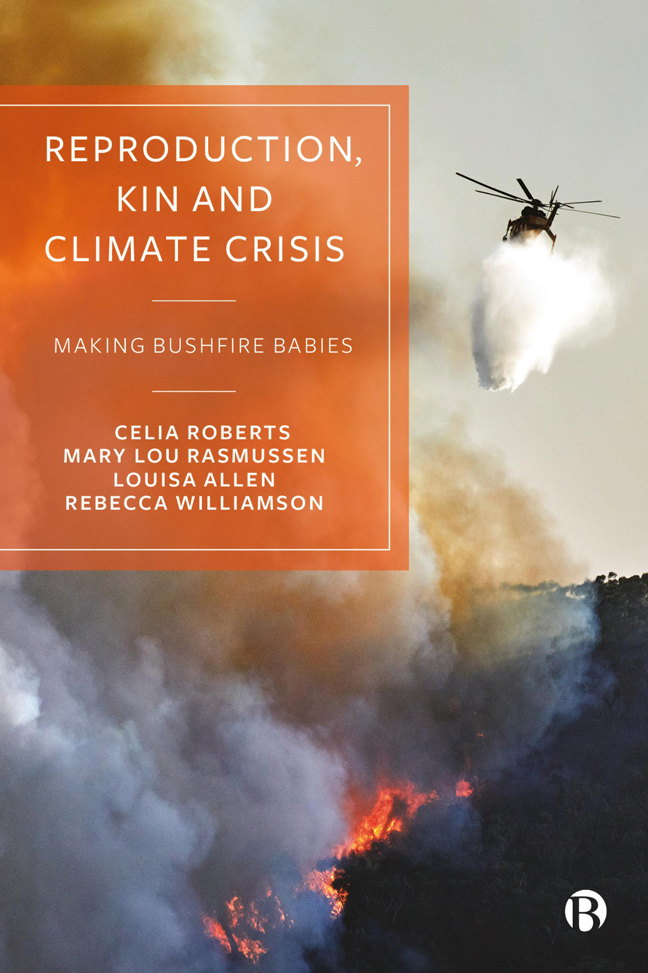Book contents
- Frontmatter
- Contents
- List of Figures and Table
- Notes on the Figures
- Notes on the Authors
- Acknowledgements
- Interleave 1
- 1 Reproducing in Climate Crisis
- Interleave 2
- 2 Methods in Crisis
- Interleave 3
- 3 Breath, Breathing and ‘Mum-Guilt’
- Interleave 4
- 4 Smoke, Machines and Public Health
- Interleave 5
- 5 Kin, Care and Crises
- Interleave 6
- 6 Pyro-reproductive Futures
- Interleave 7
- 7 Making Bushfire Babies
- Notes
- References
- Index
6 - Pyro-reproductive Futures
Published online by Cambridge University Press: 24 January 2024
- Frontmatter
- Contents
- List of Figures and Table
- Notes on the Figures
- Notes on the Authors
- Acknowledgements
- Interleave 1
- 1 Reproducing in Climate Crisis
- Interleave 2
- 2 Methods in Crisis
- Interleave 3
- 3 Breath, Breathing and ‘Mum-Guilt’
- Interleave 4
- 4 Smoke, Machines and Public Health
- Interleave 5
- 5 Kin, Care and Crises
- Interleave 6
- 6 Pyro-reproductive Futures
- Interleave 7
- 7 Making Bushfire Babies
- Notes
- References
- Index
Summary
In a forum on Making Kin Not Population (Clarke and Haraway, 2018), anthropologist Marilyn Strathern writes: ‘Population and reproduction are cunningly entangled; increasingly they are also entangled with climate. The cunning of the concept [population] is that it can be exposed where it hurts: try not thinking of babies when you think of population’ (Strathern et al, 2019: 160). In our study, we talked to people about how they make decisions about having children and we saw how this was entangled with their imaginings of, and relations to, population and climate crisis. Participants were not only speculating about their own reproductive futures, but were also observing those around them discussing and making reproductive decisions in relation to concerns about the environment, and, specifically, overpopulation.
In order to explore these connections, we asked participants in this study: “How do you feel about the idea of people having children in general, in the context of climate change?” Answering this question when you have recently had a baby might be tricky. Answering this question when you’ve just had a baby and are living through the start of a frightening global pandemic that has followed quickly on the heels of devastating bushfires is, as one of our participants said, “confronting”. Actually, we hesitated to ask. Although we really wanted to know what our participants think about wider issues relating to reproduction and climate, we did not want to evoke guilt or shame or to add to their already considerable list of worries. So, we posed the question at the end of the interviews, after a rapport had been built, and tried to keep it rather light in tone.
In this chapter we analyse participants’ responses as articulating the logics and affects of Pyro-reproduction as they unfold in their worlds. We explore the conceptual and material threads participants drew upon – perhaps consciously, perhaps not – to formulate their answers and to explain to us what they felt the connections between having a child and climate change might be. Sometimes their responses felt like a justification or a defence, at other times more like perplexity, but in almost all cases our question provoked disconcertment and even embarrassed laughter. Thinking about babies and population together, no matter how ‘natural’ the connection seems, exposes us where it hurts.
- Type
- Chapter
- Information
- Reproduction, Kin and Climate CrisisMaking Bushfire Babies, pp. 151 - 176Publisher: Bristol University PressPrint publication year: 2023



